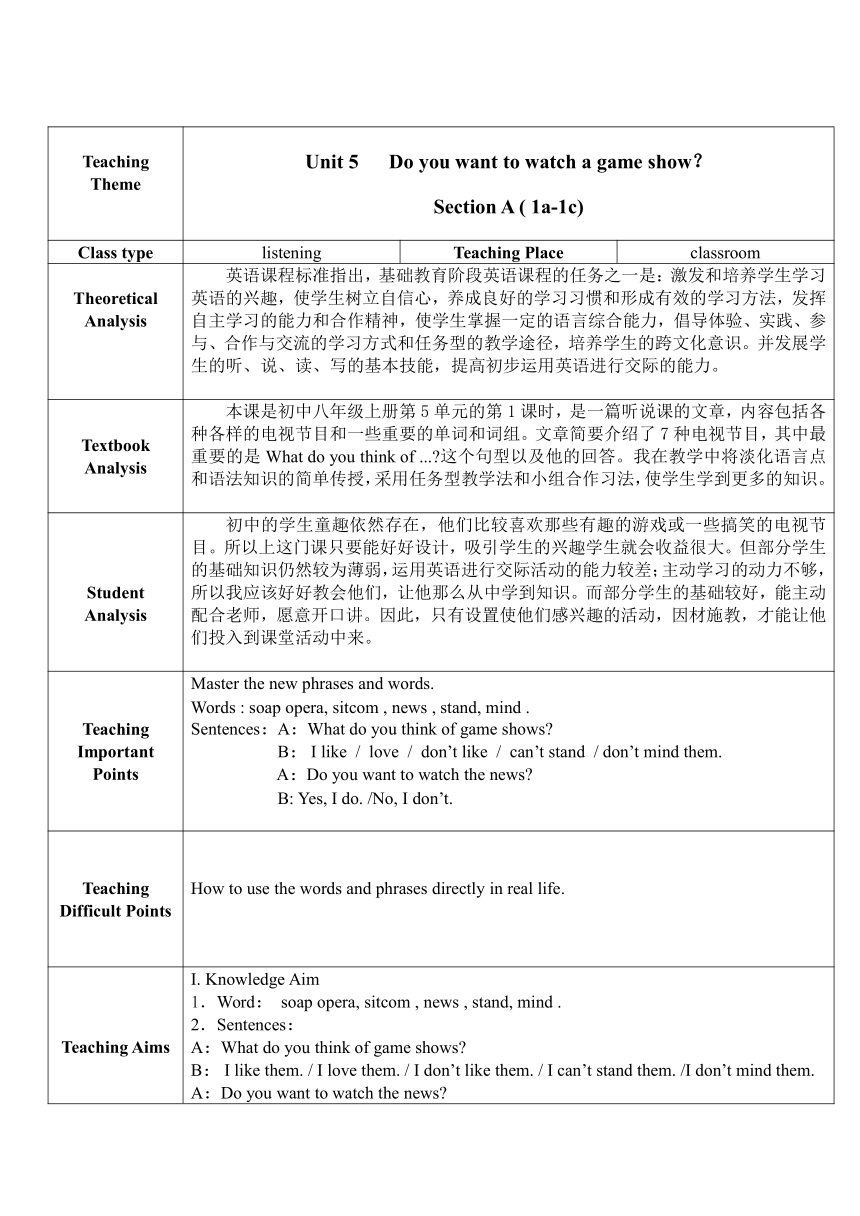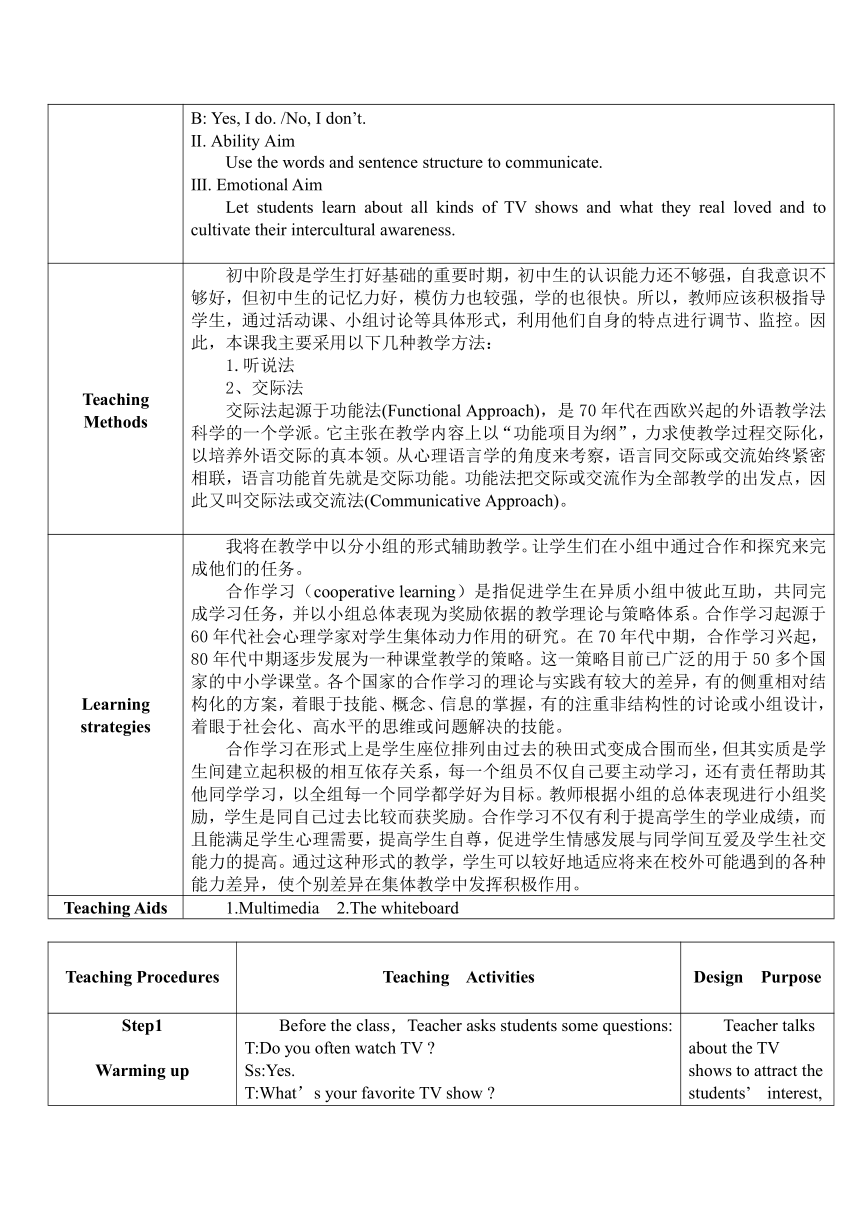人教版八年级上册 Unit5 Do you want to watch a game show Section A 教案(表格式)
文档属性
| 名称 | 人教版八年级上册 Unit5 Do you want to watch a game show Section A 教案(表格式) |  | |
| 格式 | zip | ||
| 文件大小 | 78.0KB | ||
| 资源类型 | 教案 | ||
| 版本资源 | 人教新目标(Go for it)版 | ||
| 科目 | 英语 | ||
| 更新时间 | 2023-01-19 19:13:46 | ||
图片预览


文档简介
TeachingTheme Unit 5 Do you want to watch a game show?Section A ( 1a-1c)
Class type listening Teaching Place classroom
Theoretical Analysis 英语课程标准指出,基础教育阶段英语课程的任务之一是:激发和培养学生学习英语的兴趣,使学生树立自信心,养成良好的学习习惯和形成有效的学习方法,发挥自主学习的能力和合作精神,使学生掌握一定的语言综合能力,倡导体验、实践、参与、合作与交流的学习方式和任务型的教学途径,培养学生的跨文化意识。并发展学生的听、说、读、写的基本技能,提高初步运用英语进行交际的能力。
Textbook Analysis 本课是初中八年级上册第5单元的第1课时,是一篇听说课的文章,内容包括各种各样的电视节目和一些重要的单词和词组。文章简要介绍了7种电视节目,其中最重要的是What do you think of ... 这个句型以及他的回答。我在教学中将淡化语言点和语法知识的简单传授,采用任务型教学法和小组合作习法,使学生学到更多的知识。
Student Analysis 初中的学生童趣依然存在,他们比较喜欢那些有趣的游戏或一些搞笑的电视节目。所以上这门课只要能好好设计,吸引学生的兴趣学生就会收益很大。但部分学生的基础知识仍然较为薄弱,运用英语进行交际活动的能力较差;主动学习的动力不够,所以我应该好好教会他们,让他那么从中学到知识。而部分学生的基础较好,能主动配合老师,愿意开口讲。因此,只有设置使他们感兴趣的活动,因材施教,才能让他们投入到课堂活动中来。
TeachingImportant Points Master the new phrases and words.Words : soap opera, sitcom , news , stand, mind . Sentences:A:What do you think of game shows B: I like / love / don’t like / can’t stand / don’t mind them. A:Do you want to watch the news B: Yes, I do. /No, I don’t.
Teaching Difficult Points How to use the words and phrases directly in real life.
Teaching Aims Ⅰ. Knowledge Aim1.Word: soap opera, sitcom , news , stand, mind . 2.Sentences:A:What do you think of game shows B: I like them. / I love them. / I don’t like them. / I can’t stand them. /I don’t mind them. A:Do you want to watch the news B: Yes, I do. /No, I don’t.Ⅱ. Ability AimUse the words and sentence structure to communicate.Ⅲ. Emotional AimLet students learn about all kinds of TV shows and what they real loved and to cultivate their intercultural awareness.
Teaching Methods 初中阶段是学生打好基础的重要时期,初中生的认识能力还不够强,自我意识不够好,但初中生的记忆力好,模仿力也较强,学的也很快。所以,教师应该积极指导学生,通过活动课、小组讨论等具体形式,利用他们自身的特点进行调节、监控。因此,本课我主要采用以下几种教学方法:1.听说法2、交际法交际法起源于功能法(Functional Approach),是70年代在西欧兴起的外语教学法科学的一个学派。它主张在教学内容上以“功能项目为纲”,力求使教学过程交际化,以培养外语交际的真本领。从心理语言学的角度来考察,语言同交际或交流始终紧密相联,语言功能首先就是交际功能。功能法把交际或交流作为全部教学的出发点,因此又叫交际法或交流法(Communicative Approach)。
Learning strategies 我将在教学中以分小组的形式辅助教学。让学生们在小组中通过合作和探究来完成他们的任务。合作学习(cooperative learning)是指促进学生在异质小组中彼此互助,共同完成学习任务,并以小组总体表现为奖励依据的教学理论与策略体系。合作学习起源于60年代社会心理学家对学生集体动力作用的研究。在70年代中期,合作学习兴起,80年代中期逐步发展为一种课堂教学的策略。这一策略目前已广泛的用于50多个国家的中小学课堂。各个国家的合作学习的理论与实践有较大的差异,有的侧重相对结构化的方案,着眼于技能、概念、信息的掌握,有的注重非结构性的讨论或小组设计,着眼于社会化、高水平的思维或问题解决的技能。 合作学习在形式上是学生座位排列由过去的秧田式变成合围而坐,但其实质是学生间建立起积极的相互依存关系,每一个组员不仅自己要主动学习,还有责任帮助其他同学学习,以全组每一个同学都学好为目标。教师根据小组的总体表现进行小组奖励,学生是同自己过去比较而获奖励。合作学习不仅有利于提高学生的学业成绩,而且能满足学生心理需要,提高学生自尊,促进学生情感发展与同学间互爱及学生社交能力的提高。通过这种形式的教学,学生可以较好地适应将来在校外可能遇到的各种能力差异,使个别差异在集体教学中发挥积极作用。
Teaching Aids 1.Multimedia 2.The whiteboard
Teaching Procedures Teaching Activities Design Purpose
Step1Warming up Before the class,Teacher asks students some questions:T:Do you often watch TV Ss:Yes.T:What’s your favorite TV show Ss:Talk show,sport show,talent show ...T:Do you know other TV shows Ss: ... Teacher talks about the TV shows to attract the students’ interest, and is easy to show out the new knowledge for students.
Step2 Presentation T: (Show some pictures for the students.)T: Look at the pictures and answer,what TV show is it Then,teacher shows the picture one by one ,at the same time ,students speak out the TV shows (The TV sow is talk show, sitcom, news, soap opera, game show, sports show, talent show...)Students read these shows three times with teacher.T: Now, open your books and turn to page 33, look at the picture and match the TV shows with the pictures. (Students finish 1a)Teacher asks some students to answer the picture.Answers: Talk show is e, sitcom is c, soap opera is d, game show is a, talent show is g … First, look at these pictures can help students known the name of TV shows and learn what they really do in the shows. Second, Use the pictures to present the new words can let students much like to learn it.
Step3 Listening (1b) 1.T:listen the tape and finish 1b.2.While-listeningPlay the tape twice,check the answers.3.After-listeningStudents read the tapescripts twice after teacher.4.Role-play the conversation. 1.Play the tape twice can help student check the right answer.2.Students read the tapescripts for twice after teacher, which can help students understand the conversations well.
Step4 Practice (1c) Teacher teaches students about some body language like 1c: like / love / don’t like / can’t stand / don’t mindThen teacher teaches them the conversations.Role- play the conversation.(1)Group workT:Group A ask and group B answer.Ss read the conversations.T:Now , exchange.Pair workT:Now, class, work in pairs.Ask and answer like these: A:What do you think of game shows B: I like them. / I love them. / I don’t like them. / I can’t stand them. /I don’t mind them. A:Do you want to watch the news B: Yes, I do. /No, I don’t.4.Teacher asks some pairs to show their conversations . 1.Teaching students body language to show their opinion of the shows and they also can use it in their daily life.2.Work in pairs and group can help students how to use it directly and practice well.
Step5 Discussion 1.T: Discuss with your classmates : What do you think of sitcoms/talk show/news/soap opera/game show Give your ideas and use the love/don’t mind/ don’t like ... to answer.Ask students to show their different ideas. Use the sentences we learned can help students consolidate what we learned and use it well.
Step6 Summary and Homework 1.Summary: Today, we have learned some TV shows and the important sentences in this period.2.Homework: Make a survey in your group: What kind of TV show do you know Why And then write it in a short passage . 1.Help students to remember what we learn today and consolidate the knowledge.2.Make a survey and write a passage can help students use the sentences structure well and use it in real life.What’s more,it can improve students, writing competence.
Blackboard Design Unit 5 Do you want to watch a game show? soap opera A:What do you think of game shows sitcom B: I like / love / don’t like / can’t stand/ news don’t mind them. stand A:Do you want to watch the news mind B: Yes, I do. /No, I don’t.
Reflection after Teaching 绝大部分学生对电视节目都感兴趣,但平时父母都限制他们看电视,因此今天在课堂上学生对电视节目的讨论积极性很高。以后我会多帮学生联系实际,创设情境,帮助他们更好地学习、掌握知识。
Class type listening Teaching Place classroom
Theoretical Analysis 英语课程标准指出,基础教育阶段英语课程的任务之一是:激发和培养学生学习英语的兴趣,使学生树立自信心,养成良好的学习习惯和形成有效的学习方法,发挥自主学习的能力和合作精神,使学生掌握一定的语言综合能力,倡导体验、实践、参与、合作与交流的学习方式和任务型的教学途径,培养学生的跨文化意识。并发展学生的听、说、读、写的基本技能,提高初步运用英语进行交际的能力。
Textbook Analysis 本课是初中八年级上册第5单元的第1课时,是一篇听说课的文章,内容包括各种各样的电视节目和一些重要的单词和词组。文章简要介绍了7种电视节目,其中最重要的是What do you think of ... 这个句型以及他的回答。我在教学中将淡化语言点和语法知识的简单传授,采用任务型教学法和小组合作习法,使学生学到更多的知识。
Student Analysis 初中的学生童趣依然存在,他们比较喜欢那些有趣的游戏或一些搞笑的电视节目。所以上这门课只要能好好设计,吸引学生的兴趣学生就会收益很大。但部分学生的基础知识仍然较为薄弱,运用英语进行交际活动的能力较差;主动学习的动力不够,所以我应该好好教会他们,让他那么从中学到知识。而部分学生的基础较好,能主动配合老师,愿意开口讲。因此,只有设置使他们感兴趣的活动,因材施教,才能让他们投入到课堂活动中来。
TeachingImportant Points Master the new phrases and words.Words : soap opera, sitcom , news , stand, mind . Sentences:A:What do you think of game shows B: I like / love / don’t like / can’t stand / don’t mind them. A:Do you want to watch the news B: Yes, I do. /No, I don’t.
Teaching Difficult Points How to use the words and phrases directly in real life.
Teaching Aims Ⅰ. Knowledge Aim1.Word: soap opera, sitcom , news , stand, mind . 2.Sentences:A:What do you think of game shows B: I like them. / I love them. / I don’t like them. / I can’t stand them. /I don’t mind them. A:Do you want to watch the news B: Yes, I do. /No, I don’t.Ⅱ. Ability AimUse the words and sentence structure to communicate.Ⅲ. Emotional AimLet students learn about all kinds of TV shows and what they real loved and to cultivate their intercultural awareness.
Teaching Methods 初中阶段是学生打好基础的重要时期,初中生的认识能力还不够强,自我意识不够好,但初中生的记忆力好,模仿力也较强,学的也很快。所以,教师应该积极指导学生,通过活动课、小组讨论等具体形式,利用他们自身的特点进行调节、监控。因此,本课我主要采用以下几种教学方法:1.听说法2、交际法交际法起源于功能法(Functional Approach),是70年代在西欧兴起的外语教学法科学的一个学派。它主张在教学内容上以“功能项目为纲”,力求使教学过程交际化,以培养外语交际的真本领。从心理语言学的角度来考察,语言同交际或交流始终紧密相联,语言功能首先就是交际功能。功能法把交际或交流作为全部教学的出发点,因此又叫交际法或交流法(Communicative Approach)。
Learning strategies 我将在教学中以分小组的形式辅助教学。让学生们在小组中通过合作和探究来完成他们的任务。合作学习(cooperative learning)是指促进学生在异质小组中彼此互助,共同完成学习任务,并以小组总体表现为奖励依据的教学理论与策略体系。合作学习起源于60年代社会心理学家对学生集体动力作用的研究。在70年代中期,合作学习兴起,80年代中期逐步发展为一种课堂教学的策略。这一策略目前已广泛的用于50多个国家的中小学课堂。各个国家的合作学习的理论与实践有较大的差异,有的侧重相对结构化的方案,着眼于技能、概念、信息的掌握,有的注重非结构性的讨论或小组设计,着眼于社会化、高水平的思维或问题解决的技能。 合作学习在形式上是学生座位排列由过去的秧田式变成合围而坐,但其实质是学生间建立起积极的相互依存关系,每一个组员不仅自己要主动学习,还有责任帮助其他同学学习,以全组每一个同学都学好为目标。教师根据小组的总体表现进行小组奖励,学生是同自己过去比较而获奖励。合作学习不仅有利于提高学生的学业成绩,而且能满足学生心理需要,提高学生自尊,促进学生情感发展与同学间互爱及学生社交能力的提高。通过这种形式的教学,学生可以较好地适应将来在校外可能遇到的各种能力差异,使个别差异在集体教学中发挥积极作用。
Teaching Aids 1.Multimedia 2.The whiteboard
Teaching Procedures Teaching Activities Design Purpose
Step1Warming up Before the class,Teacher asks students some questions:T:Do you often watch TV Ss:Yes.T:What’s your favorite TV show Ss:Talk show,sport show,talent show ...T:Do you know other TV shows Ss: ... Teacher talks about the TV shows to attract the students’ interest, and is easy to show out the new knowledge for students.
Step2 Presentation T: (Show some pictures for the students.)T: Look at the pictures and answer,what TV show is it Then,teacher shows the picture one by one ,at the same time ,students speak out the TV shows (The TV sow is talk show, sitcom, news, soap opera, game show, sports show, talent show...)Students read these shows three times with teacher.T: Now, open your books and turn to page 33, look at the picture and match the TV shows with the pictures. (Students finish 1a)Teacher asks some students to answer the picture.Answers: Talk show is e, sitcom is c, soap opera is d, game show is a, talent show is g … First, look at these pictures can help students known the name of TV shows and learn what they really do in the shows. Second, Use the pictures to present the new words can let students much like to learn it.
Step3 Listening (1b) 1.T:listen the tape and finish 1b.2.While-listeningPlay the tape twice,check the answers.3.After-listeningStudents read the tapescripts twice after teacher.4.Role-play the conversation. 1.Play the tape twice can help student check the right answer.2.Students read the tapescripts for twice after teacher, which can help students understand the conversations well.
Step4 Practice (1c) Teacher teaches students about some body language like 1c: like / love / don’t like / can’t stand / don’t mindThen teacher teaches them the conversations.Role- play the conversation.(1)Group workT:Group A ask and group B answer.Ss read the conversations.T:Now , exchange.Pair workT:Now, class, work in pairs.Ask and answer like these: A:What do you think of game shows B: I like them. / I love them. / I don’t like them. / I can’t stand them. /I don’t mind them. A:Do you want to watch the news B: Yes, I do. /No, I don’t.4.Teacher asks some pairs to show their conversations . 1.Teaching students body language to show their opinion of the shows and they also can use it in their daily life.2.Work in pairs and group can help students how to use it directly and practice well.
Step5 Discussion 1.T: Discuss with your classmates : What do you think of sitcoms/talk show/news/soap opera/game show Give your ideas and use the love/don’t mind/ don’t like ... to answer.Ask students to show their different ideas. Use the sentences we learned can help students consolidate what we learned and use it well.
Step6 Summary and Homework 1.Summary: Today, we have learned some TV shows and the important sentences in this period.2.Homework: Make a survey in your group: What kind of TV show do you know Why And then write it in a short passage . 1.Help students to remember what we learn today and consolidate the knowledge.2.Make a survey and write a passage can help students use the sentences structure well and use it in real life.What’s more,it can improve students, writing competence.
Blackboard Design Unit 5 Do you want to watch a game show? soap opera A:What do you think of game shows sitcom B: I like / love / don’t like / can’t stand/ news don’t mind them. stand A:Do you want to watch the news mind B: Yes, I do. /No, I don’t.
Reflection after Teaching 绝大部分学生对电视节目都感兴趣,但平时父母都限制他们看电视,因此今天在课堂上学生对电视节目的讨论积极性很高。以后我会多帮学生联系实际,创设情境,帮助他们更好地学习、掌握知识。
同课章节目录
- Unit 1 Where did you go on vacation?
- Section A
- Section B
- Unit 2 How often do you exercise?
- Section A
- Section B
- Unit 3 I'm more outgoing than my sister.
- Section A
- Section B
- Unit 4 What's the best movie theater?
- Section A
- Section B
- Unit 5 Do you want to watch a game show?
- Section A
- Section B
- Unit 6 I'm going to study computer science.
- Section A
- Section B
- Unit 7 Will people have robots?
- Section A
- Section B
- Unit 8 How do you make a banana milk shake?
- Section A
- Section B
- Unit 9 Can you come to my party?
- Section A
- Section B
- Unit 10 If you go to the party, you'll have a grea
- Section A
- Section B
